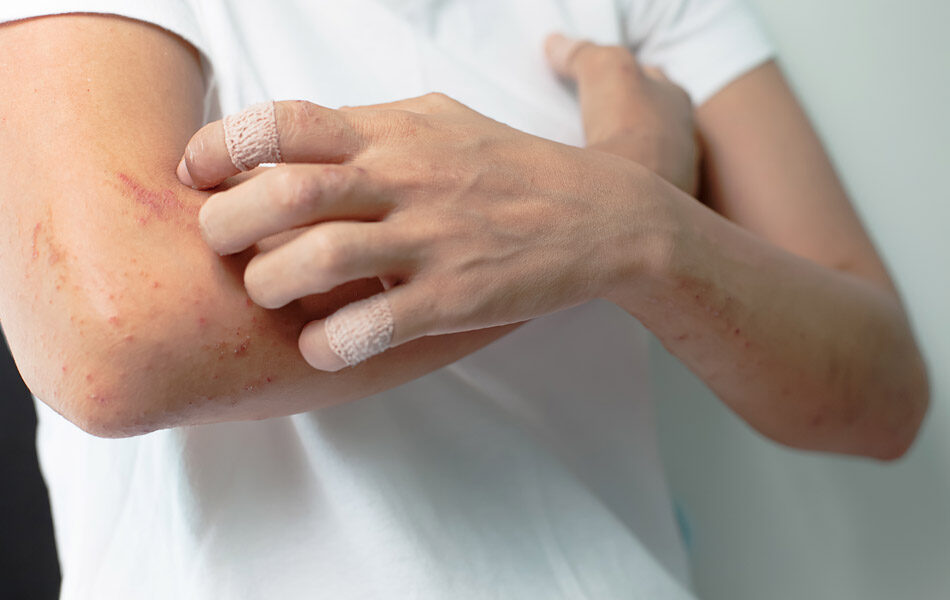Can Stress Cause Shingles? Herpes Zoster, Painful Rash, Stress Management Tips
Shingles is a painful rash that emerges on one side of the body, usually in older adults. It is commonly believed that there is a link between stress and shingles. This article explores the causes of shingles and offers 3 tips for managing stress to help you maintain a healthy immune system.

If you’ve had chickenpox, the virus that causes it lies dormant in your body and can be triggered by a number of factors. Instead of causing chickenpox, the reawakened varicella-zoster virus causes shingles.
It usually affects older adults and is so common that 1 in 3 people in America will get shingles in their lifetime. Many develop shingles when experiencing psychological stress or adverse life events, which raises the question: does stress trigger shingles?
In this article, we explore the chickenpox virus, how it causes shingles, and the link between stress and shingles. We also offer 3 tips for managing your stress.
Can Stress Cause Shingles?
Yes, stress can cause shingles. If you have had chickenpox, the varicella-zoster virus, also referred to as the herpes zoster virus, lies dormant in your body. When it is triggered, it causes shingles.
The risk factors for developing shingles include age, diseases that compromise the immune system, such as HIV, cancer treatment, and some medications, like the long-term use of cortisone.
However, this painful rash is frequently triggered in people experiencing psychological stress, leading doctors and scientists to examine the link between stress and shingles.
Both stressful life events and chronic stress can negatively impact your immune system, making you more susceptible to bacterial and viral infections. In this way, stress can trigger shingles.
What Is Shingles?
Shingles is a viral infection caused by the varicella-zoster virus, the same virus that causes chickenpox. Shingles, or herpes zoster, is a painful rash that forms fluid-filled blisters on either the left or right side of your body or face and usually healths within 2–6 weeks.
However, some people experience ongoing pain called postherpetic neuralgia. It can be severe and debilitating and last a few months to years after the infection. According to the statistics, 10–18% of people who get shingles will experience postherpetic neuralgia.
It is recommended that you consult with your healthcare provider within 3 days of developing the rash. Treating shingles involves taking prescription medication that helps speed up recovery and prevent complications. You can also use calamine lotion to soothe the itching and pain medications if you are experiencing severe pain.
It is recommended that people over 50 and those 19 or older with weak immune systems get the shingles vaccine. Two doses of the shingles vaccine are required to prevent herpes zoster from causing shingles and its complications.
How do shingles feel?
The shingles rash starts with inflamed, itchy, tingling, or burning skin. As it progresses and blisters, you may experience sharp, shooting nerve pain in the affected area that can be moderate to severe and triggered by the slightest touch.
The pain usually starts to subside when the blisters break open and scab. However, some people experience postherpetic neuralgia, which can be extremely painful and debilitating.
What Causes Shingles?
The varicella-zoster virus, the same virus that causes chickenpox, is also responsible for causing shingles. Once you’ve contracted the virus and had chickenpox, the varicella-zoster virus DNA remains in your body. When the virus reactivates, instead of causing chickenpox, you develop shingles.
The risk factors for developing shingles include being over 50, being treated for cancer or diseases such as HIV, which compromise your immune system, and taking medication that suppresses the immune system, including treatment for autoimmune diseases.
Some studies show that psychological stress may also be a risk factor for developing shingles. Stress may cause a weakened immune system, making you more vulnerable to a herpes zoster infection.
What are the First Signs of Shingles?
The first signs that you have shingles are similar to those of most other infectious diseases: fatigue, headaches, fever, and chills may precede the development of a rash.
Before the rash appears, you may feel a tingling or burning sensation, itchiness, or pain in the affected area. After that, the rash develops, the skin becomes inflamed, and fluid-filled blisters break open and scab over.
Where on the Body do Shingles Appear?
One of the defining characteristics of shingles is that the rash appears on only one side of your body, usually on your back, abdomen, or face, when the varicella virus is reactivated.
The virus lies dormant in the nerves that supply the skin, referred to as dermatomes, and when it is triggered, it causes symptoms that follow the path of the affected nerve. It is most common for the virus to be found in the thoracic (middle back), cervical (neck), and trigeminal (face) dermatomes.
How to Manage Your Stress? 3 Tips to Follow
Shingles and stress go hand in hand, and psychological stress resulting from adverse life events can weaken your immune system and make you more susceptible to infections.
Your stress levels will increase as a result of chronic stress and stressful life events, and your body and mind may begin to exhibit signs that you are under pressure. Stress symptoms include difficulty sleeping, general aches and pains, depression, or excessive eating and drinking.
Stress management begins by identifying your stress triggers and learning how to reduce emotional stress. Stressful situations are normal, but you can reduce stress by relaxing, taking care of yourself, and connecting with friends and family.
#1 Engage in relaxing activities
Anything that shifts your focus away from stressful events can help you be happier and reduce stress. Relaxing activities such as yoga, pilates, tai chi, and meditation, as we all as art, music, and water therapy, can help reduce stress.
However, dedicating time to such activities can be difficult in our modern time-pressured lives. Fortunately, technology places the help we need in the palms of our hands through self-help applications.
#2 Take care of yourself
A healthy diet is the cornerstone of well-being, but knowing where to start and what to eat is not always easy. For example, should you eat multigrain bread or Ezekiel bread? Which meat is better for your health: beef or chicken? Luckily, there are nutrition apps you can use to get started.
Staying hydrated is also critical for optimal body functionality. Drinking water is the best way to ensure you meet your body’s daily requirements. However, tea and coffee also contribute to your water intake, but you must remember that they contain caffeine, and you should limit your intake to about 4 cups per day.
Exercise has numerous benefits for your body and your brain, too. It is generally accepted that the minimum amount of exercise we should do is 150 minutes of moderate to high-intensity exercise per week, or half an hour 5 times per week.
#3 Create meaningful connections
Having strong social connections improves physical and mental health. Spending quality time with friends and family has been shown to add years to your life, strengthen your immune system, and help you cope better with negative life events.
When you feel connected to others in your community, you may experience lower stress levels and less depression and anxiety. The result is improved spiritual, emotional, and physical well-being.
FAQs
Eye shingles can occur in all parts of the eye: the eyelid, the cornea, the surface, or the inner parts of the eye. The eye appears red and inflamed and may weep.
Unlike other viral infections that cause a rash, such as chickenpox, monkeypox, or measles, shingles do not spread all over the body. It is isolated to a band of skin on only one side of your back, abdomen, or face. It doesn’t usually affect the arms and legs.
Yes, shingles can make you emotional. Studies have found that herpes zoster and postherpetic neuralgia may cause depression, anxiety, and insomnia. It is especially true when the pain caused by shingles persists, as it can negatively impact your quality of life.
A Word From a Nutritionist
Shingles occurs most commonly in older adults or people with weakened immune systems. Therefore, to prevent shingles, you must eat a healthy, balanced diet, focusing on immune-boosting foods.
For example, brightly colored fruit and vegetables are rich sources of potent antioxidants in the form of phytonutrients. Try to include broccoli, blueberries, and carrots in your daily meals.
Chronic inflammation can negatively impact your immune system, so eating foods that reduce inflammation will help boost your immunity. Omega-3 fatty acids in fish, such as sea bass, avocados, and walnuts, can help reduce chronic inflammation.
Conclusion
Although stress isn’t a direct cause of shingles, chronic stress can weaken your immune system, which is one of the main risk factors for developing shingles from the dormant varicella-zoster virus.
The best way to prevent shingles is by getting the shingles vaccine. However, research has shown a link between stress and shingles. Therefore, taking care of yourself and engaging in relaxing activities to reduce your stress levels will help boost your immune system and reduce your risk of experiencing severe pain and complications of herpes zoster.

















































 Select your language:
Select your language: 










